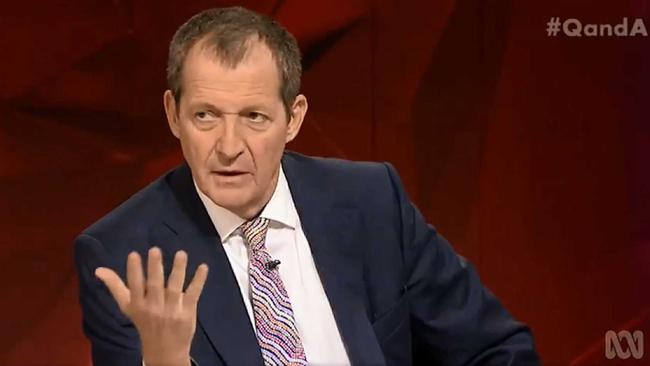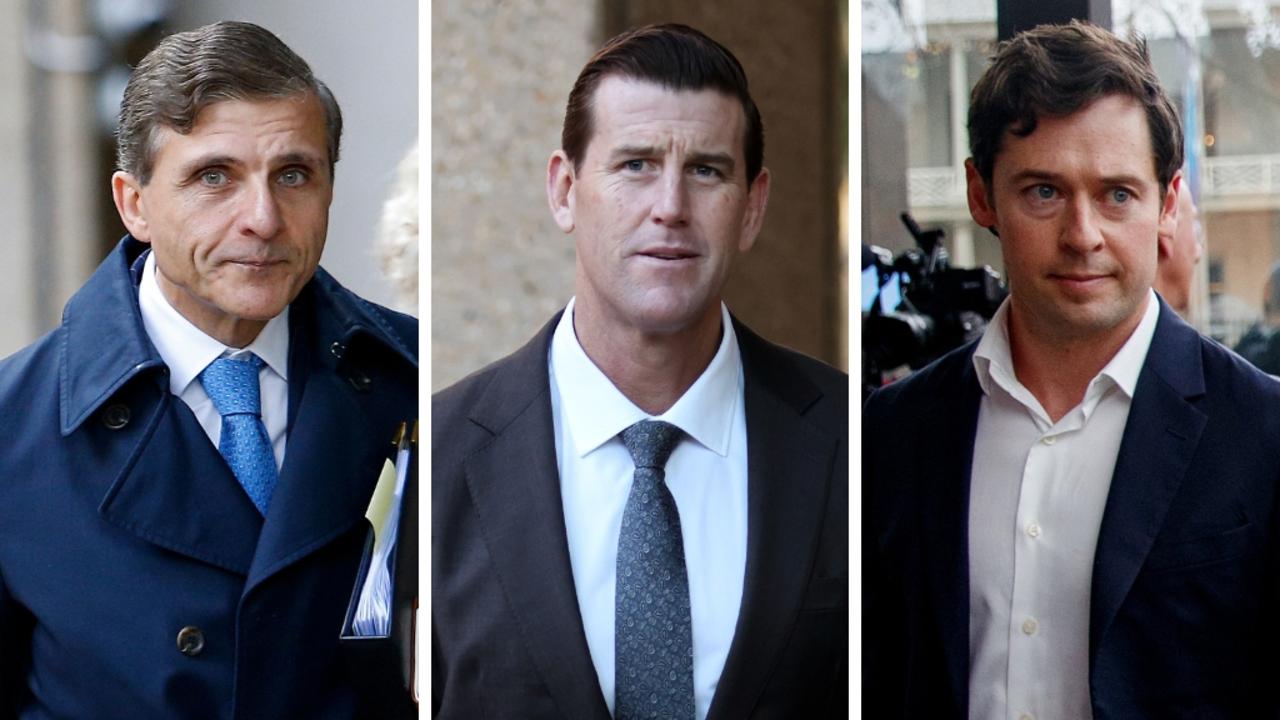Q&A: Alastair Campbell likens Donald Trump to Hitler, Third Reich rhetoric
Tony Blair’s former media adviser comes under fire for “over the top” attack on the US President.

Press secretary to former British prime minister Tony Blair Alastair Campbell enlivened this week’s episode of Q&A by saying President Donald Trump’s leadership had echoes of Hitler’s Third Reich of the 1930s.
“I think (President Trump) is a real problem for the world. America is the most powerful democracy in the world ... and I think in most countries, with the possible exception of Russia, the majority of people find Donald Trump pretty much despicable,” Mr Campbell said.
“There is a populist virus in the world at the moment,” said Mr Campbell, now a political strategist and mental health advocate.
“I think (Trump) is a racist. The worst thing about it is we knew all this before he was elected and the people still elected him.
“I’m reading (this book about the Third Reich) and can’t put it down. On every page you feel the resonance. So that thing he did the other day with the four Congresswomen of colour — Hitler was doing that stuff.”
Executive director of the Menzies Centre and columnist at The Australian Nick Cater said Mr Campbell’s argument about President Trump and the rise of populism was “troubling rhetoric”.
“To compare Trump to the 1930s, I suppose if you’re talking about fascism, Italy and Germany, I think is just way over the top,” Mr Cater said.
Griffith University political scientist Anne Tiernan said President Trump’s most recent attack on immigrant politicians, on Twitter and at a rally in North Carolina, where the crowd chanted “send her back” about Democratic congresswoman Ilhan Omar, was “chilling”.
“I think you’re hitting on the Democratic discontent and anxiety that’s characterising our politics ... populists on the left and right position themselves as outsiders,” Ms Tiernan said.
“They’re aggressively nationalist, that’s why you’re disturbed. And they’re often anti-immigrant. And Trump’s assault on these four women has had a chilling effect.”
CEO of the Property Industry Foundation Kate Mills said mass immigration had become a topic that the left refused to talk about without branding people “racist”, and argued there needed to be more nuance in the conversation to discourage populist politics.
“Mass immigration into the United States and the UK, and increasing immigration into (Australia), is one of the big causes of where this populist leaders get their beliefs from,” Ms Mills said.
“The left, in terms of the way (immigration) is approached ... has meant it’s made it difficult for us to talk about massive immigration without being considered a racist. We have to decouple them. If people are unhappy about mass immigration as I think they are — we need to address it.”
Former WA Premier Geoff Gallop said President Trump was breaking down hope in America and across the world and was driven by an “implicit fascism”.
“What’s happening in the world today is there’s a counter enlightenment ... what we’re seeing at the moment is an enormous reaction against that, represented very much by President Trump. (Part of President Trump’s leadership) is talking the foul language; the prejudiced politics, the racism, (a) sort of implicit fascism.”
Mental Health
The panel turned to mental health, with both Mr Campbell and Mr Gallop speaking candidly about their own struggles with mental health, and an audience member breaking down in tears while she asked a question about how suicides would be prevented.
Mr Campbell said his generation, and politicians, were not sure how to deal with teenagers and young adults dealing with mental health concerns, because they didn’t know what was driving it.
“I think the problem with our generation is I’m not sure we really know what’s going on with young people, Mr Campbell said. “I think we sort of think oh it’s this, it’s social media, but I think the truth is we don’t really know.”
He said Prime Minister Scott Morrison and the Australian government needed less talk and more action on mental health.
Mr Cater challenged Mr Campbell, saying Mr Morrison was spending a record amount of money on mental health.
“It is slowly (changing)… the Morrison government last year invested $4.8 billion dollars in it, we can argue it’s not enough, but it’s the most ever. And included in that, Alastair, is half a billion towards a national suicide prevention plan,” Mr Cater said.
Mr Campbell proposed a mental health service which was as all-encompassing as a physical health service.
“We think about the health service and we basically mean physical, as in hospital and doctors. We don’t have a mental health service. We have a mental crisis service. Even then, as you found, it can be very, very lacking ... can we please have services which match the scale of the need?”
Brexit
Mr Cater said Brexit would be the making of Britain and not the destruction, after an audience member asked if Brexit was the “last gasp” of the British Empire.
“This is the rebirth of Great Britain. It’s a chance for you to start looking outwards again,” Mr Cater said.
“Fast forward to the present and you’re in a Europe that is looking increasingly irrelevant to the rest of the world ... go back to your old Commonwealth mates,” he continued, arguing soon-to-be UK Prime Minister Boris Johnson was what the country needed as it faced Brexit.
“I think the thing is we’ve had possibly the worst prime minister the Tories have ever produced in Theresa May, completely not up to the task of steering this important reform… But at least in Boris ... he is tough enough to say we are going to go for the tough Brexit which is what it’s going to take.”
Mr Campbell, on the other hand, said Mr Johnson had lied to win the referendum on leaving the European Union, and could cause the decline of Britain as a world power.
“Inside (Mr Johnson’s) head he’s Winston Churchill. In reality, he’s a hack. He’s funny, as you say, he’s a funny hack.”
Ms Mills argued Australia could learn important lessons from the Brexit referendum when trying to make any significant constitutional change, alluding to the proposal for a referendum on acknowledgment of Indigenous Australians in the constitution.
“The lesson for Australia to me is very simple,” she said. “When you’re asking an important question, make sure you ask the right question. The problems that come from Britain is they asked a binary question ... which they set up, I think, incorrectly to get the result that they have ended up with.
“When we as a nation, or any nation, is looking at making an important decision you have to think it through.”



To join the conversation, please log in. Don't have an account? Register
Join the conversation, you are commenting as Logout